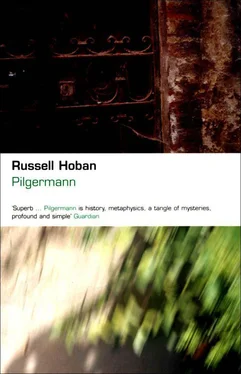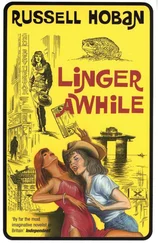Russell Hoban - Pilgermann
Здесь есть возможность читать онлайн «Russell Hoban - Pilgermann» весь текст электронной книги совершенно бесплатно (целиком полную версию без сокращений). В некоторых случаях можно слушать аудио, скачать через торрент в формате fb2 и присутствует краткое содержание. Год выпуска: 2002, Издательство: Bloomsbury Publishing PLC, Жанр: Современная проза, на английском языке. Описание произведения, (предисловие) а так же отзывы посетителей доступны на портале библиотеки ЛибКат.
- Название:Pilgermann
- Автор:
- Издательство:Bloomsbury Publishing PLC
- Жанр:
- Год:2002
- ISBN:нет данных
- Рейтинг книги:5 / 5. Голосов: 1
-
Избранное:Добавить в избранное
- Отзывы:
-
Ваша оценка:
- 100
- 1
- 2
- 3
- 4
- 5
Pilgermann: краткое содержание, описание и аннотация
Предлагаем к чтению аннотацию, описание, краткое содержание или предисловие (зависит от того, что написал сам автор книги «Pilgermann»). Если вы не нашли необходимую информацию о книге — напишите в комментариях, мы постараемся отыскать её.
Pilgermann — читать онлайн бесплатно полную книгу (весь текст) целиком
Ниже представлен текст книги, разбитый по страницам. Система сохранения места последней прочитанной страницы, позволяет с удобством читать онлайн бесплатно книгу «Pilgermann», без необходимости каждый раз заново искать на чём Вы остановились. Поставьте закладку, и сможете в любой момент перейти на страницу, на которой закончили чтение.
Интервал:
Закладка:
Certainly we are the slaves of that which looks out through our eyes, and it is nothing simple, that outlooker; does it want to live, does it want to die? As with my arms red up to the elbows I sew up the wounded I crave to be where the shouting is, the cries and groans, the clash of weapons. I am afraid to be there but what looks out through my eyes wants to put me there, it doesn’t want to be left out of anything, it wants to be everywhere at once, it wants to be included in all matters of life and death, wants to be at the same time here in the shuddering light of the torches and there across the river in the obscurity of battle and the night.
From the wounded we hear something of the fighting: when the Turks had first attacked the Frankish camp one of the Frankish leaders, Raymond Saint-Gilles, had immediately got together some of his knights and led a charge into the dark. Those Franks! You could wake them up out of a sound sleep in the middle of the night and they would open their eyes fighting. It was Raymond’s charge that had driven Yaghi-Siyan back across the bridge and had very nearly carried the Franks through the bridge gate and into Antioch. But when they were more than halfway across the bridge there had come galloping wildly back towards them in the darkness a riderless horse and the Franks faltered and fled, pursued by the newly confident Turks.
The Franks put to rout by a riderless horse! Surely here is a sign for those who know how to read it! Surely here is an action parable! Now Yaghi-Siyan and his cavalrymen, blood-spattered riders on blood-spattered horses, return. They are many fewer than they were when they rode into the obscurity on the other side of the bridge. They are tired but their eyes are bright; for the moment they are the slaughterers and not the cattle. The green-and-gold banner droops proudly on its staff like a male member that has done a good night’s work.
The morning comes again, every time is like a first time, every time the morning happens it seems surprised at its actuality but it offers no opinions, it only reckons up what has happened in the night. ‘Here there are so many dead horses, so many dead men,’ says the morning. ‘See how they are dead. These men will not do anything more. They have no more to say. The horses will not walk, trot, canter, gallop. They will do nothing. Here there is only so much dead meat.’
Now in the first light of this grey and impassive morning this dead meat becomes newly active and inspires new activity in both the Franks and the Turks. While the Frankish bowmen shoot up at us and we on the walls shoot down at them, some of the Franks, protecting themselves as well as they can with their shields, gather up their dead from the river bank and the bridge. Some of the dead they sling over their backs to be newly killed by our arrows, some they drag away, some they carry off on litters. The arrows glance off their helmets, stick in their shields, stick in the rings of their mail shirts; at this close range some of the arrows pierce the mail and some find a naked throat. One of the Franks falls and lies shuddering with an arrow in his back, then is still, requiring now the labour of his comrades. There are some dead horses beyond the far end of the bridge; all the closer ones were dragged (by teams of horses that shied and danced sidewise and showed the whites of their eyes) into Antioch last night. These dead horses on the other side of the river, each of them may well have carried a man to his death last night; now each will give life to many men for several days. The shocking thought arises: how much better off everybody would be if the Franks would go away somewhere and butcher their horses and live quietly on the meat.
There are dead Turks beyond the far end of the bridge, and there are now seen among them other Franks who are not like the Franks that I have just been speaking of. These men move with perhaps something of a birdlike hop in their walk; one can imagine that a moment ago they have flapped down from the grey sky on black wings and turned into men. Some of the dead Turks they drag away by their legs, others they tie by their arms and legs to poles to be carried off by two men. The air is blackened with our arrows but at that distance they are only like bee-stings. Later we smell the smoke of the cooking-fires of these Franks.
Seeing all this in this grey dawn that is surprised to be here but is not surprised at anything else I have in my eyes what I see but I have also that riderless horse that I did not see, it is an image of green fire in the obscurity of last night that is still in my eyes.
There is in the light of this grey morning something that moves with a sickening motion behind the curtain of grey light. It is not like the riderless horse that galloped across the bridge, it is like those horses of last night that lifted up their heads and fell back again, lifted and fell back. This morning is seen as if in a flawed mirror. The curtain of air shakes and sways, one feels drunk, the ground beneath one’s feet will not maintain its proper plane, its proper steady stillness. The earth seems to be retching, shuddering.
Bembel Rudzuk and I fling ourselves to the ground, others do the same. Perhaps the earth itself is a riderless horse, showing the whites of its eyes and galloping to its death. Lying prone on the top of the wall I feel the stones beneath me shift, I see cracks where there were none before. Hidden Lion cannot be seen from where we are but with the eye of the mind I see the tower on David’s Wheel tottering, shaking, bricks are jumping off it; I see the tiles of Hidden Lion lifting, moving, leaping out of the pattern, breaking, crumbling. The thought comes to me that the earth is sick of humankind, it is trying to vomit itself up to be rid of us.
The curtain of grey light is still shaking, the world still looks out at us from a flawed mirror. Several horses have broken loose and are galloping through the streets as if in a dream; from the Frankish camp we hear singing and praying; in its caverns underneath the city Onopniktes shouts in the darkness, ecstatic like a prophet as stones topple from the four hundred towers, from Justinian’s wall, from the bridge across the Orontes. I see in my mind the river, roiled and muddy, strangely heaving, shuddering as it runs with its surface pocked and dimpled by the trembling beneath the river bed. There is a gabble of voices all around us and a continual sobbing and praying. With my cheek against the stones and my vision at an unaccustomed angle I see the spire of the minaret of the central mosque slowly sway and fall.
In the gabble of voices on the wall and rising from the streets below we hear in Turkish, in Syriac, in Arabic, and in Greek the words ‘punishment’ and ‘judgment’. Some think the punishment is for one thing, some think it is for another; the Christians beheaded on Hidden Lion are spoken of by many. There is also some lamentation for the destruction of a shrine of Nemesis and the pulling down of a statue of Tyche, the Goddess of Fortune. (‘All that happened centuries ago,’ says Bembel Rudzuk, ‘but still they talk about it when the earth shakes, all these good Muslims lamenting the departed goddesses of Rome.’) Many think that the Christian Patriarch John, who is in prison, ought to be freed. It is thought by some that if he is freed he will pray for the safety of Antioch; others think that he is more likely to pray if he is kept in prison. All this time there is a wild neighing of unseen horses. Soon a wagon rattles past, it is pulled by men, the horses are too unmanageable to be put in harness. In the wagon is an iron cage and in the cage, desperately clinging to the bars, his face white, his beard flying, is the Patriarch. Later we hear that the cage has been hung by chains from the wall and that he has prayed constantly for God’s mercy.
Читать дальшеИнтервал:
Закладка:
Похожие книги на «Pilgermann»
Представляем Вашему вниманию похожие книги на «Pilgermann» списком для выбора. Мы отобрали схожую по названию и смыслу литературу в надежде предоставить читателям больше вариантов отыскать новые, интересные, ещё непрочитанные произведения.
Обсуждение, отзывы о книге «Pilgermann» и просто собственные мнения читателей. Оставьте ваши комментарии, напишите, что Вы думаете о произведении, его смысле или главных героях. Укажите что конкретно понравилось, а что нет, и почему Вы так считаете.












